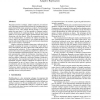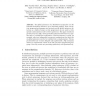96 search results - page 9 / 20 » Concurrency Combinators for Declarative Synchronization |
TACAS
2007
Springer
14 years 1 months ago
2007
Springer
Abstract. Our main objective is to combine partial-order methods with verification techniques for infinite-state systems in order to obtain efficient verification algorithms fo...
ICS
1999
Tsinghua U.
13 years 11 months ago
1999
Tsinghua U.
This paper presents a technique, adaptive replication, for automatically eliminating synchronization bottlenecks in multithreaded programs that perform atomic operations on object...
SAC
2010
ACM
13 years 9 months ago
2010
ACM
The control flow of common processors does not match the specific needs of reactive systems. Key issues for these systems are preemption and concurrency, combined with timing pred...
CONCURRENCY
2008
13 years 7 months ago
2008
Abstract. The global quiescence of a distributed computation (or distributed termination detection) is an important problem. Some concurrent programming languages and systems provi...
ICFP
2008
ACM
14 years 7 months ago
2008
ACM
Transactional events (TE) are an approach to concurrent programming that enriches the first-class synchronous message-passing of Concurrent ML (CML) with a combinator that allows ...


